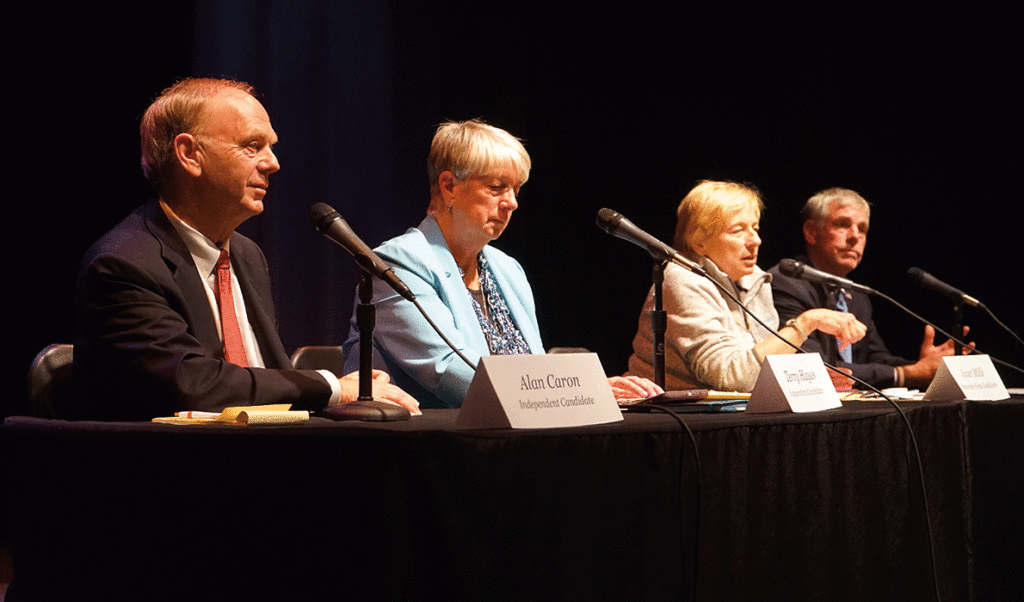By Tom Groening
Pundits have characterized Maine’s four-way gubernatorial campaign as low-key, and the nature of an Oct. 4 candidate forum in Rockland bore out that observation.
Independents Alan Caron and Terry Hayes were joined by Democrat Janet Mills and Republican Shawn Moody on the stage of The Strand theater, fielding questions about offshore wind turbines, access to working waterfront, the commissioner of Marine Resources, and right whales.
The event was hosted by the Maine Coast Fishermen’s Association, The Alewife Harvesters of Maine, Maine Lobstermen’s Association, and Maine Aquaculture Association.
Early on, Hayes asked audience members to indicate if they were working in the seafood harvesting industry, or if their family drew income from harvesting. Fewer than ten hands were raised.
One contrast drawn among the mostly genial interaction among the candidates came in response to a question about offshore wind turbines.
Moody said turbines pose an aesthetic threat to parts of Maine, and that he wouldn’t want to see them near scenic places like Moosehead, Rangeley, and Sebago lakes.
Caron called for the state to develop a 30-year energy plan, with a likely focus on solar power.
Mills noted wind power’s potential, saying the resource could hold as much as 156 gigawatts within 50 miles of the state’s coast, equal to two Maine Yankee-sized nuclear power plants. She added that the fishing industry should be seen as stakeholders in any permitting, and that fishermen should be compensated for the loss of grounds.
Mills also suggested wind turbines could be paired with mussel rafts.
The looming threat of more federal restrictions on lobstering to protect North Atlantic right whales prompted promises of support from Mills and Moody.
“Until they pin this on the state of Maine,” Mills said of the decline in right whales, “they should not seriously consider restrictions.”
Moody seemed to blame environmental groups.
“There’s a lot of money that funds these activities,” he said, and feared lobstermen would get “steamrolled by a government agency.” Using ropeless fishing gear “is not feasible, not practical,” he said, and pledged to fishermen to “go to the mat for you.”
Caron said it was easy to rail against regulators and others, but cited agreements reached in the past when lobstering and the shipping industry worked to ease conflict between their interests. If elected, his administration would “put a pause button on” pending regulation, he said.
On access to working waterfront infrastructure, Mills cited the Land for Maine’s Future program as an effective mechanism, Moody observed that fishermen using wharves off Portland’s Commercial Street were “just getting squeezed out,” while Caron urged stakeholders to present a unified front. He also suggested the state’s three-port strategy should be augmented with “a mini-port strategy.”
Current Department of Marine Resources Commissioner Pat Keliher, who generally gets high marks from fishermen, also was a topic, as a question asked who each candidate might nominate for the post.
Mills said she’d favor someone with expertise in the industry, “someone who’s come up the ranks,” and who is a good communicator.
Moody would seek input from the industry, but would want “someone who’s going to call people back.”
Hayes said she had served with Keliher on a state board, and was “very impressed” with him.





